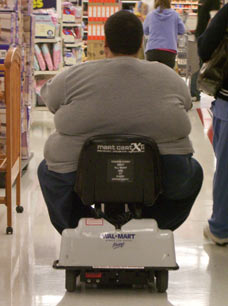Study says mis-reading GPs can't help obese
 A new study says GPs are failing to help obese Australians lose weight because they mistake low levels of health literacy with a lack of motivation.
A new study says GPs are failing to help obese Australians lose weight because they mistake low levels of health literacy with a lack of motivation.
University of New South Wales research shows one in five Australians just do not understand how to lose weight, something GPs sometimes interpret as laziness.
The report suggests health providers need to play a bigger role in the battle against obesity.
But some argue that doctors are being unfairly targeted, because most simply do not have time to treat the underlying problems of obesity.
The researchers from UNSW looked at common ways that GPs and nurses managed overweight and obese patients with low health literacy, focusing on 20 practices in Sydney and Adelaide.
They found just a handful of the 61 health staff surveyed reported actually having assessed a patient's health literacy.
The academics said it showed that GPs should take more responsibility and more effectively communicate with patients about how to lose weight.
“The real issue is in terms of effectively communicating what to do about it,” Professor Mark Harris, the director of the Centre for Primary Health Care at the University of New South Wales, told the ABC.
“It's more how to deliver it to a patient who perhaps is from a low educational background or... they're from another language group,” he said.
Professor Harris said three in five Australians were under-informed about effective ways to lose weight, while one in five Australians had low health literacy overall.
“The GP needs to ask patients what they've understood but not as a test of the patient but a test of the GP's ability to explain that,” he said.
Professor Harris and his team have moved on to an assessment of how National Health and Medical Research Council guidelines on obesity education in GP visits can be better incorporated in standard GP practices.







 Print
Print